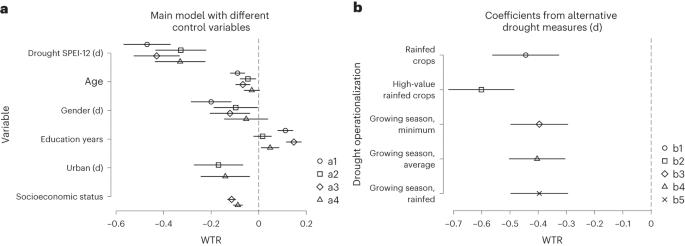Drought exposure decreases altruism with salient group identities as key moderator
IF 29.6
1区 地球科学
Q1 ENVIRONMENTAL SCIENCES
引用次数: 2
Abstract
Previous research on climate change impact regularly considers conflict outcomes, thereby disregarding cooperative behaviour such as altruism. Drought has the potential to fuel inter-ethnic cleavages, thus contributing to conflicts. Yet this runs against resilience arguments suggesting people who experience environmental hardship are more cooperative. Here we examine altruism in survey experiments in a natural setting among refugees from Syria and Iraq. We match survey responses to observational data on drought and socioeconomic variables. Our findings speak to both arguments. First, we show that drought exposure is associated with decreased altruism for survey respondents generally. We further show how group identity moderates the relationship between drought and altruism. Our results suggest a decrease in altruism due to drought is much larger when the target of altruism is presented as a member of an antagonistic ethno-religious outgroup. Climate-induced extreme events could lead to drastic socioeconomic consequences, including altered cooperation behaviours. With survey experiments among Iraqi and Syrian refugees, this study finds drought experience could reduce altruism and group identity function as the key moderator.

干旱暴露降低利他主义,显著的群体身份是关键调节因素
以往关于气候变化影响的研究通常考虑的是冲突结果,从而忽略了利他主义等合作行为。干旱有可能加剧种族间的分裂,从而引发冲突。然而,这与复原力论点背道而驰,该论点认为经历过环境困境的人更具有合作精神。在此,我们在自然环境下对来自叙利亚和伊拉克的难民进行了利他主义调查实验。我们将调查回答与有关干旱和社会经济变量的观察数据相匹配。我们的研究结果证明了这两个论点。首先,我们表明干旱与调查对象利他主义的普遍降低有关。我们进一步说明了群体认同如何调节干旱与利他主义之间的关系。我们的研究结果表明,当利他主义的目标是一个对立的民族-宗教外群体的成员时,干旱导致的利他主义下降幅度要大得多。气候引发的极端事件可能导致严重的社会经济后果,包括合作行为的改变。通过对伊拉克和叙利亚难民的调查实验,本研究发现干旱经历会降低利他主义,而群体认同是关键的调节因素。
本文章由计算机程序翻译,如有差异,请以英文原文为准。
求助全文
约1分钟内获得全文
求助全文
来源期刊

Nature Climate Change
ENVIRONMENTAL SCIENCES-METEOROLOGY & ATMOSPHERIC SCIENCES
CiteScore
40.30
自引率
1.60%
发文量
267
审稿时长
4-8 weeks
期刊介绍:
Nature Climate Change is dedicated to addressing the scientific challenge of understanding Earth's changing climate and its societal implications. As a monthly journal, it publishes significant and cutting-edge research on the nature, causes, and impacts of global climate change, as well as its implications for the economy, policy, and the world at large.
The journal publishes original research spanning the natural and social sciences, synthesizing interdisciplinary research to provide a comprehensive understanding of climate change. It upholds the high standards set by all Nature-branded journals, ensuring top-tier original research through a fair and rigorous review process, broad readership access, high standards of copy editing and production, rapid publication, and independence from academic societies and other vested interests.
Nature Climate Change serves as a platform for discussion among experts, publishing opinion, analysis, and review articles. It also features Research Highlights to highlight important developments in the field and original reporting from renowned science journalists in the form of feature articles.
Topics covered in the journal include adaptation, atmospheric science, ecology, economics, energy, impacts and vulnerability, mitigation, oceanography, policy, sociology, and sustainability, among others.
 求助内容:
求助内容: 应助结果提醒方式:
应助结果提醒方式:


